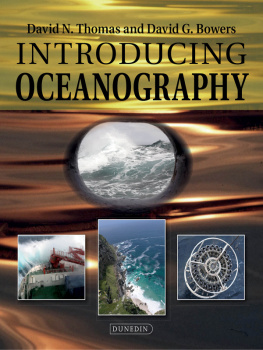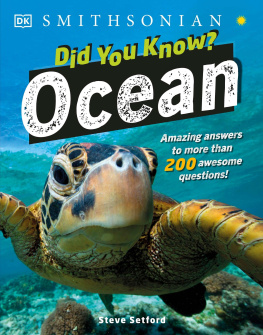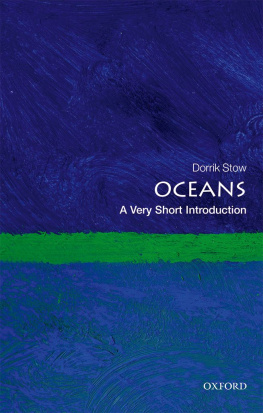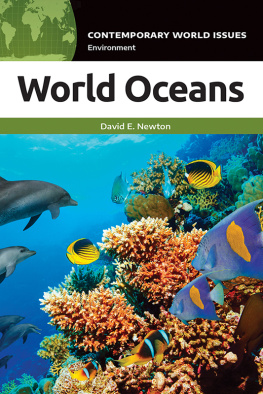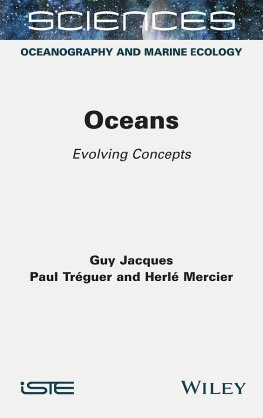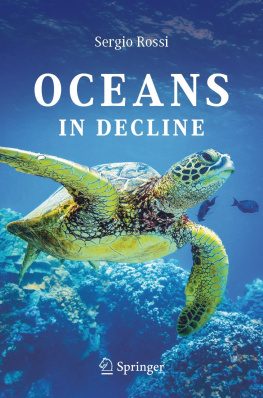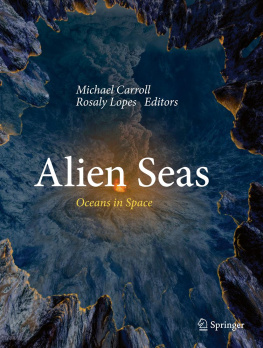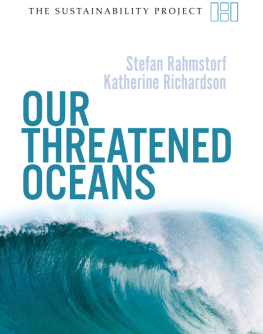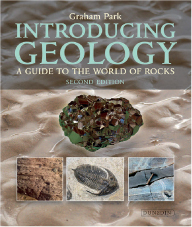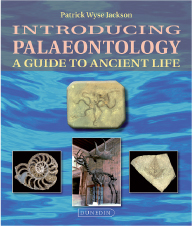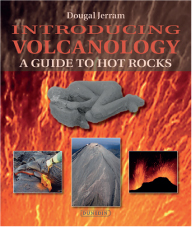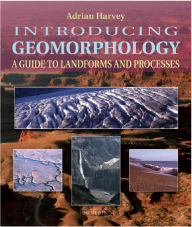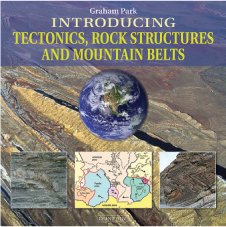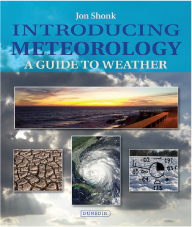For further details of these and other Dunedin Earth and Environmental Sciences titles see:
www.dunedinacademicpress.co.uk
Introducing
Oceanography
David N. Thomas and David G. Bowers

For several years we both had the privilege of teaching a course on Shelf Sea Oceanography with Dr Sarah Jones (19622008).
Sarah was an inspiration to the students as well as to us.
We dedicate this book to her memory.
Published by
Dunedin Academic Press Ltd
www.dunedinacademicpress.co.uk
Head Office
Hudson House, 8 Albany Street
Edinburgh, EH1 3QB
London Office
The Towers, 54 Vartry Road,
London, N15 6PU
Paperback book: 9781780460017
ePub: 9781903544556
ePub (Amazon/Kindle): 9781903544709
ePub (iPad, Fixed Layout): 9781903544716
David N. Thomas and David G. Bowers 2012
The right of David N. Thomas and David G. Bowers to be identified as the authors of this work has been asserted by them in accordance with sections 77 and 78 of the Copyright, Designs and Patents Act 1988
All rights reserved.
No part of this publication may be reproduced or transmitted in any form or by any means or stored in any retrieval system of any nature without prior written permission, except for fair dealing under the Copyright, Designs and Patents Act 1988 or in accordance with the terms of a licence issued by the Copyright Licensing Society in respect of photocopying or reprographic reproduction. Full acknowledgement as to author, publisher and source must be given. Application for permission for any other use of copyright material should be made in writing to the publisher.
British Library Cataloguing in Publication data
A catalogue record for this book is available from the British Library
Design and layout by Makar Publishing Production, Edinburgh
Printed and bound in Poland by Hussar Books
Preface
The study of the oceans, or oceanography, is of critical importance to all humans on the planet. Of the 198 nations in the world there are only 48 that are totally land-locked. But even those living in regions cut off from the oceans depend on shipping to transport goods and services. The oceans are a rich source of food for billions of humans. There is nowhere on the surface of the planet that does not rely on the effects that the oceans have on climate, and even more importantly in driving major water, oxygen, carbon dioxide, nitrogen and other cycles of the elements fundamental to life on Earth.
There is no escaping the importance of studying the oceans and understanding how they work. For oceanographers it is a privilege to work in such an important and exciting research field. As can be seen in Figure i.i, processes in the oceans span space and time scales from fractions of millimetres and seconds to tens of thousands of years, influencing millions of square kilometres.
No individual can study all aspects of oceanography by themselves. The oceans are complex chemical mixtures; the biological diversity and abundances are huge; a myriad of physical processes are vital for determining where the water goes and why. The oceans span the climate regions from the poles to the tropics. Oceanographers include specialists in physics, chemistry, biology, geology, mathematical modelling, atmospheric scientists, and space scientists working with satellites, among others. People working on the possibilities of life on extraterrestrial planets also look to the ocean for proxies of life further afield. To make any sense of their individual measurements it is often (mostly) vital that scientists from these different disciplines collaborate to synthesise their findings to understand the whole picture.
Although state-of-the-art technologies enable us to observe the oceans from space using satellites, there is only really one way to study oceanography, and that is to take to the seas in a research vessel. Such oceanographic cruises are voyages of discovery and thrilling opportunities. They are hard work and can last many months (although can be just a matter of hours or days). They can take the ships to regions of the world where wind and waves conspire to make life on board a ship very uncomfortable indeed. On the other hand, watching the sun set (or rise) on the horizon of a calm tropical ocean is quite the opposite.
In this short introduction we aim to give you a flavour of what oceanography is about. Naturally we can only touch on a few issues, but we hope to give you enough to make you want to find out more.
Note: all terms highlighted in bold are defined in the Glossary at the end of the book.
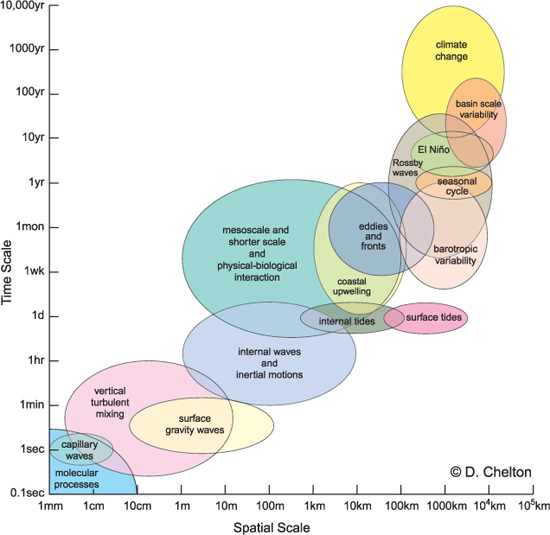
Figure i.i The study of ocean processes varies from the tiny scale physics at the size of a bacteria cell through to global ocean circulation patterns over tens of thousands of years.
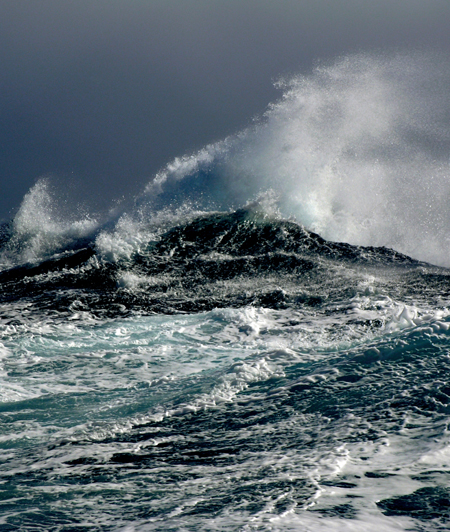
The water of the oceans
Oceanography is the scientific study of the oceans, and of the organisms that live in them. Lets start by considering the dimensions of the subject before us. The oceans cover a large part (roughly 70%) of the earths surface, but their vertical scale is small compared to the horizontal. Figure 1.1 shows a map of ocean depths. There are mountains and valleys on the sea floor, just as there are on dry land, but the average depth of all the oceans is about 4 km. This compares to the width of the oceans, which is variable, but which is of order 10,000 km. The ratio of the width to depth, the aspect ratio, is therefore 10,000:4, or 2,500:1. Thats about the same as the aspect ratio of the page you are reading right now. Although oceans are thin compared to their width, changes with depth are very important, as we shall see in this chapter. For example, the temperature of ocean water can change as much in going down a few kilometres from the surface at the equator to the ocean floor as it can in travelling along the surface from the equator to the poles.

